Pranab Mukherjee
| His Excellency प्रणब मुखर्जी | |
|---|---|
| Pranab Mukherjee | |
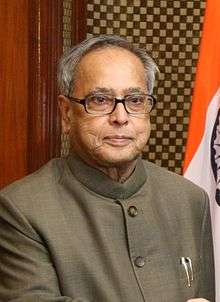 | |
| 13th President of India | |
|
Assumed office 25 July 2012 | |
| Prime Minister |
Manmohan Singh Narendra Modi |
| Vice President | Mohammad Hamid Ansari |
| Preceded by | Pratibha Patil |
| Minister of Finance | |
| Preceded by | P. Chidambaram |
| Succeeded by | Arun Jaitley |
|
In office 5 January 1982 – 31 December 1984 | |
| Preceded by | R. Venkataraman |
| Succeeded by | V. P. Singh |
| Minister of Defence | |
|
In office 22 May 2004 – 27 October 2006 | |
| Prime Minister | Manmohan Singh |
| Preceded by | George Fernandes |
| Succeeded by | A. K. Antony |
| Minister of External Affairs | |
|
In office 24 October 2006 – 22 May 2009 | |
| Prime Minister | Manmohan Singh |
| Preceded by | Manmohan Singh |
| Succeeded by | S. M. Krishna |
|
In office 10 February 1995 – 16 May 1996 | |
| Prime Minister | P. V. Narasimha Rao |
| Preceded by | Dinesh Singh |
| Succeeded by | Sikander Bakht |
| Deputy Chairman of the Planning Commission | |
|
In office 24 June 1991 – 15 May 1996 | |
| Prime Minister | P. V. Narasimha Rao |
| Preceded by | Mohan Dharia |
| Succeeded by | Madhu Dandavate |
| Leader of the House (Lok Sabha) | |
|
In office 22 May 2004 – 26 June 2012 | |
| Prime Minister | Manmohan Singh |
| Preceded by | Atal Bihari Vajpayee |
| Succeeded by | Sushil Kumar Shinde |
| Leader of the House (Rajya Sabha) | |
|
In office January 1980 – 31 December 1984 | |
| Prime Minister | Indira Gandhi |
| Preceded by | K.C. Pant |
| Succeeded by | V.P. Singh |
| Member of Lok Sabha for Jangipur | |
|
In office 10 May 2004 – 26 June 2012 | |
| Prime Minister | Manmohan Singh |
| Preceded by | Abul Hasnat Khan |
| Succeeded by | Abhijit Mukherjee |
| Member of Parliament (Rajya Sabha) for West Bengal, Gujrat (5 Terms) | |
|
In office 24 July 1969 – 10 May 2004 (5 Terms) | |
| Personal details | |
| Born |
Pranab Kumar Mukherjee প্রণব কুমার মুখোপাধ্যায় December 11, 1935 Mirati, British Bengal, British India |
| Political party | Independent |
| Other political affiliations |
Indian National Congress (1969–86; 1989–2012) Rashtriya Samajwadi Congress (1986–89) |
| Spouse(s) |
Suvra Mukherjee (m. 1957-died 2015) |
| Children |
Sharmistha Abhijit Indrajit |
| Residence | Rashtrapati Bhavan |
| Alma mater | University of Calcutta |
| Religion | Hinduism |
| Website | Official Website |
Pranab Kumar Mukherjee (Bengali: প্রণব মুখোপাধ্যায়) (Bengali: [prənəb kʊmɑr mʉkhərdʒi]; born 11 December 1935) is the 13th and current President of India, in office since July 2012. In a political career spanning six decades, Mukherjee was a senior leader of the Indian National Congress and occupied several ministerial portfolios in the Government of India. Prior to his election as President, Mukherjee was Union Finance Minister from 2009 to 2012, and the Congress party's top troubleshooter.
Mukherjee got his break in politics in 1969 when Prime Minister Indira Gandhi helped him get elected to the Rajya Sabha, the upper house of Parliament, on a Congress ticket. Following a meteoric rise, he became one of Indira Gandhi's most trusted lieutenants, and a minister in her cabinet by 1973. During the controversial Internal Emergency of 1975–77, he was accused (like several other Congress leaders) of committing gross excesses. Mukherjee's service in a number of ministerial capacities culminated in his first stint as finance minister in 1982–84. Mukherjee was also Leader of the House in the Rajya Sabha from 1980 to 1985.
Mukherjee was sidelined from the Congress during the premiership of Rajiv Gandhi, Indira's son. Mukherjee had viewed himself, and not the inexperienced Rajiv, as the rightful successor to Indira following her assassination in 1984. Mukherjee lost out in the ensuing power struggle. He formed his own party, the Rashtriya Samajwadi Congress, which merged with the Congress in 1989 after reaching a consensus with Rajiv Gandhi. Mukherjee's political career revived when Prime Minister P. V. Narasimha Rao appointed him Planning Commission head in 1991 and foreign minister in 1995. Following this, as elder statesman of the Congress, Mukherjee was the principal and architect of Sonia Gandhi's ascension to the party's presidency in 1998.
When the Congress-led United Progressive Alliance (UPA) came into power in 2004, Mukherjee won a Lok Sabha (the popularly elected lower house of Parliament) seat for the first time. From then until his resignation in 2012, Mukherjee was practically number-two in Prime Minister Manmohan Singh's government. He held a number of key cabinet portfolios—Defence (2004–06), External Affairs (2006–09) and Finance (2009–12)—apart from heading several Groups of Ministers (GoMs) and being Leader of the House in the Lok Sabha. After securing the UPA's nomination for the country's presidency in July 2012, Mukherjee comfortably defeated P. A. Sangma in the race to Rashtrapati Bhavan, winning 70 percent of the electoral-college vote.
Early life and career
Pranab was born in a Bengali Brahmin family[1] in Mirati in the Birbhum district of Bengal province (now in West Bengal). His father was active in the Indian independence movement and was a member of West Bengal Legislative Council between 1952 and 1964 as a representative of the Indian National Congress and was the member of AICC. His mother was Rajlakshmi.[2][3][4]
He attended the Suri Vidyasagar College in Suri (Birbhum), then affiliated to University of Calcutta.[5] He subsequently earned an MA degree in Political Science and History and also LL.B.degree both from University of Calcutta.[3]
He was an upper-division Clerk in the Office of the Deputy Accountant-General (Post and Telegraph) in Calcutta. In 1963, he became Lecturer(Asst.Prof.)teaching Political Science at the Vidyanagar College (in South 24 Parganas)[6] and he also worked as a Journalist with the Desher Dak (Call of Motherland) before entering politics.[7]
Early political career
Mukherjee's political career began in 1969, when he managed the successful Midnapore by-election campaign of an independent candidate, V. K. Krishna Menon. Then Prime Minister of India, Indira Gandhi, recognised Mukherjee's talents and recruited him to her party, the Indian National Congress.[8] He became a member of the Rajya Sabha (the upper house of Indian parliament) in July 1969. Mukherjee was re-elected to the house in 1975, 1981, 1993 and 1999.[5]
Mukherjee became a Gandhi loyalist, and is often described as her "man for all seasons".[9] Mukherjee's rise was rapid in the early phase of his career and he was appointed Union Deputy Minister of Industrial Development in Indira Gandhi's cabinet in 1973. Mukherjee was active in the Indian cabinet during the controversial Internal Emergency of 1975–77. Ruling Congress politicians of the day including Mukherjee were accused of using extra-constitutional powers to "wreck established norms and rules of governance". Following the Congress's defeat in the 1977 general elections, the newly formed Janata government-appointed Shah Commission indicted Mukherjee; however, the commission was itself later indicted for stepping "outside its jurisdiction" in 1979. Mukherjee emerged unscathed and rose through a series of cabinet posts to become Finance Minister from 1982 to 1984.[10][11]
His term was noted for his work in improving the finances of the government that enabled Gandhi to score a political point by returning the last instalment of India's first IMF loan.[12] As Finance Minister, Mukherjee signed the letter appointing Manmohan Singh as Governor of the Reserve Bank of India.[8]

In 1979, Mukherjee became Deputy Leader of the INC in the Rajya Sabha, and in 1980 he was appointed Leader of the House.[5] Mukherjee was considered the top-ranking Indian cabinet minister and he presided over cabinet meetings in the absence of the Prime Minister.
Mukherjee was sidelined from the INC following the assassination of Indira Gandhi. Although Mukherjee was much more experienced in politics than Indira's son, Rajiv Gandhi, it was Rajiv who gained control. Mukherjee lost his position in the cabinet and was sent to manage the regional West Bengal Pradesh Congress Committee. He had considered himself to be Indira's likely successor and, siding with those within his party who aligned themselves against Rajiv Gandhi, Mukherjee was eventually expelled.[9][13]
In 1986, Mukherjee founded another party, the Rashtriya Samajwadi Congress (RSC), in West Bengal. The RSC and INC merged three years later after reaching a compromise with Rajiv Gandhi. The RSC had fared terribly in the 1987 Assembly polls in West Bengal. Many analysts, over the years, have attributed the muting of Mukherjee's political aspirations as the supreme leader due to his inability to emerge as a magnetic mass leader.[9] On later being asked that did he ever desire to become Prime Minister, Mukherjee, however, replied, "7 RCR was never my destination."[14] The Zee News noted: "The statement assumes heft in the light of the longstanding speculation that Mukherjee, as one of the doyens of Congress, always nursed an ambition to occupy the top executive post."[14]
Mukherjee's political career revived following the assassination of Rajiv Gandhi in 1991 when P. V. Narasimha Rao chose to appoint him as deputy chairman of the Indian planning commission and subsequently as a union cabinet minister. Mukherjee served as External Affairs Minister for the first time from 1995 to 1996 in Rao's cabinet.[5]
Mukherjee today is considered to be a Gandhi family loyalist and the principal architect of Sonia Gandhi's entry into politics, a mentoring responsibility he is still believed to be shouldering.[9] He was made General Secretary of the AICC in 1998–99 after Sonia Gandhi became Congress President. Mukherjee was made President of the West Bengal Congress in 2000 and held the position until his resignation in 2010. He had earlier held the position in 1985.[3]
Mukherjee became Leader of the House in the Lok Sabha in 2004.[5] He contested and won a Lok Sabha seat from Jangipur in West Bengal which he would later retain in 2009. It was speculated in 2004 that Mukherjee would be made Prime Minister of India after Sonia Gandhi unexpectedly declined the position.[15] However, Gandhi eventually nominated Manmohan Singh to become Prime Minister.[13]
Mukherjee was briefly considered for the post of the largely ceremonial Indian presidency in 2007 but his name was subsequently dropped after his contribution in the Union Cabinet was considered practically indispensable.[13]
Mukherjee held many important posts in the Manmohan Singh government. He had the distinction of being the Minister for various high-profile Ministries including Defence, Finance, and External Affairs. Mukherjee also headed the Congress Parliamentary Party and the Congress Legislative Party which consists of all the Congress MPs and MLAs in the country apart from being Leader of the House in Lok Sabha and Bengal Pradesh Congress Committee President.[5]
Mukherjee ended his affiliation with the Indian National Congress and retired from active political life following his election as President in 2012. The Economic Times had noted: "[the] decades of activity in critical all-round roles make [Mukherjee's] exit both a structural and generation shift. With him, the last of the Congress triumvirate – along with Rao and R Venkataraman – who formed the core team of Indira/Rajiv regimes bows out. While Rao became PM, Pranab's political marathon too ends where [Venkataraman's] did, at the Rashtrapati Bhavan."[16]
Political party role
Mukherjee is "very well respected within the party social circles."[17] Media accounts describe him as having "a reputation as a number-crunching politician with a phenomenal memory and an unerring survival instinct."[18]
Mukherjee became a member of the Congress Working Committee on 27 January 1978. He also became a member of the Central Parliamentary Board of the All India Congress Committee (AICC) that year. Mukherjee briefly held the position of treasurer of the AICC and the Congress party in 1978.[3]
Mukherjee was appointed chairman of the Campaign Committee of AICC for conducting National Elections to Parliament in 1984, 1991, 1996 and 1998. He was chairman of the Central Election Coordination Committee of the AICC from 28 June 1999 to 2012. He was appointed to the Central Election Committee on 12 December 2001. Mukherjee was appointed General Secretary of the AICC in 1998.[3] In 1997 Mukherjee was voted Outstanding Parliamentarian by the Indian Parliamentary Group.
After Sonia Gandhi reluctantly agreed to join politics, Mukherjee was one of her mentors, guiding her through difficult situations with examples of how her mother-in-law, Indira Gandhi would have done things.[19] His talents were on display during the negotiations for the Patent's Amendment Bill in early 2005. The Congress was committed to passing an IP bill, but their allies in the United Progressive Alliance from the Left front had a long tradition of opposing some of the monopoly aspects of intellectual property. Pranab Mukherjee, as Defence Minister, was not formally involved but was roped in for his negotiation skills. He drew on many old alliances including the CPI-M leader Jyoti Basu (former Chief Minister of West Bengal), and formed new intermediary positions, which included product patent and little else. Then he had to convince his own colleagues including commerce minister Kamal Nath, at one point saying: "An imperfect legislation is better than no legislation."[20] Finally the bill was approved on 23 March 2005.
India Today wrote that Mukherjee's rôle in "skillfully pushing through the historic 123 Agreement and treaty with the Nuclear Suppliers Group" may have saved UPA-II government from the 2008 motion of no confidence.[21]
Mukherjee played a crucial rôle in steering the Cabinet pre Lok Sabha elections when Prime Minister Manmohan Singh underwent a by-pass surgery in 2008–09 by taking additional charges as chairman of the Cabinet Committee of Political Affairs and Union Minister in Finance Ministry despite already being Union Minister of External Affairs.
Mukherjee was the recipient of "The Best Administrator in India" award in 2011. Prime Minister Manmohan Singh commented: "Mr. Mukherjee's knowledge of parliamentary matters was stupendous. The wide respect he commanded and his long association with the political leaders across the spectrum had proved invaluable in conducting the parliamentary business."[22]
Mukherjee's political skills and long experience in government have also led him to heading a large number of committees of Ministers in the government, a device that has been employed to obtain consensus within the members of the governing coalition on contentious issues. At the time of his resignation on being nominated as the UPA's presidential candidate, Mukherjee was heading several Groups of Ministers(GoMs) and Empowered Groups of Ministers (EGoMs).[23]
Government offices
Defence Minister
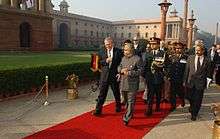
Dr. Manmohan Singh appointed Mukherjee as the Minister of Defence of India when the Congress came to power in 2004. Mukherjee held the post until 2006. He expanded co-operation with the United States during his tenure. The Times of India reported on the Wikileaks cables release and noted how " United States is full of praise for the "uniformed leadership" of Indian armed forces, especially Navy, as well as ministers like Mukherjee." Mukherjee in June 2005 had inked the 10-year Indo-US Defence Framework deal.[24]
Despite increasing co-operation with the United States, Mukherjee maintained that Russia will remain India's 'topmost' defence partner. He asserted that "Russia has been and will remain India's largest defence partner in the years to come" while inaugurating the 5th session of the Indo-Russian Inter-Governmental Commission on Military Technical Cooperation (IRIGC-MTC) in Moscow in 2005.[25]
Russia held the first joint anti-terror war games with India in Rajasthan in October 2005, during which Mukherjee and Russian Defence Minister Sergei Ivanov narrowly escaped injury after a heavy mortar landed several metres from their platform.[26] The Russian ministry subsequently declared its hopes to follow up joint military exercises in India with further joint exercises on Russian territory.[26]
Foreign Minister
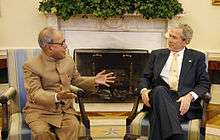
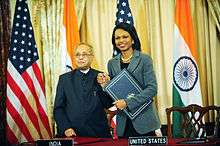
Mukherjee was appointed the External Affairs Minister of India in 1995. Under his leadership, India was made "Full Dialogue Partner" of ASEAN as part of the Look East foreign policy initiated by Narasimha Rao. Mukherjee left the position in 1996.
Mukherjee's second term began in 2006. He oversaw the successful signing of the U.S.-India Civil Nuclear Agreement with the US government and then with the Nuclear Suppliers Group, allowing India to participate in civilian nuclear trade in spite of not having signed the Nuclear Non-Proliferation Treaty. Mukherjee played a crucial role in mobilising world opinion against Pakistan after the 2008 Mumbai attacks. He left the position a year later to take over the Finance Ministry of India.[7]
When asked what legacy he wanted to leave behind as Foreign Minister of India, Mukherjee replied, "As the [man] who prepared Indian diplomacy to address the challenges of a more globalised, interdependent and uncertain world."[21]
Commerce Minister
Mukherjee has thrice served as Commerce Minister of India. His first stints were in the Indira Gandhi government from 1980–82 and again in 1984.[5] His third stint in the 1990s saw him contribute significantly to the negotiations leading to the establishment of the World Trade Organisation.[7]
Finance Minister
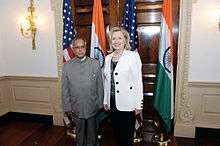
Pranab Mukherjee's first stint as the Finance minister of India was during the Indira Gandhi government in 1982. He presented his first annual budget in 1982–83. Mukherjee's first term was noted for his work in improving the finances of the government and for successfully returning the last instalment of India's first IMF loan.[12] Mukherjee signed the letter appointing Manmohan Singh as the Governor of the Reserve Bank of India in 1982.[8] Mukherjee was accused of patronage practices in the Ambani–Wadia industrial feuds.[27]
Mukherjee was credited with being an early reformer of the Indian economy. India Today wrote: "Operation Forward, which [Mukherjee] and then Industries Minister Charanjit Chanana launched in the early 1980s, started the liberalisation process that flowered under Rao and Manmohan Singh."[21] A Left wing magazine once commented that "socialism did not grow out of the pipe Mukherjee smoked."[21]
Mukherjee was removed from his position as Finance Minister by Rajiv Gandhi in 1984. Gandhi had wished to bring in his own team of staff to govern India.[16] Mukherjee was removed from his position even though he was rated as the best Finance Minister in the World that year according to a survey of Euromoney magazine.[12]
Mukherjee returned to handling the finance of India during the premiership of Narasimha Rao. He was appointed the Deputy Chairman of the Planning Commission. Since the Prime Minister of India happens to be the ex-officio chairperson of Planning Commission of India, the position of the deputy chairperson has great significance. During Mukherjee's tenure 1991–96, Dr. Manmohan Singh as Finance Minister oversaw many economic reforms to end the Licence Raj system and help open the Indian economy.[28]
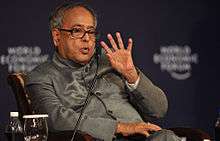
Mukherjee again became the Finance Minister of India in 2009. He presented the annual budgets in 2009, 2010 and 2011. The 2010–11 budget included the country's first explicit target to cut public debt as a proportion of GDP and Mukherjee had targeted a budget deficit reduction to 4.1% of GDP in fiscal year 2012–13, from 6.5% in 2008–09.[29]
Mukherjee implemented many tax reforms. He scrapped the Fringe Benefits Tax and the Commodities Transaction Tax. He implemented the Goods and Services Tax during his tenure. These reforms were well received by major corporate executives and economists. The introduction of retrospective taxation by Mukherjee, however, has been criticised by some economists.[30]
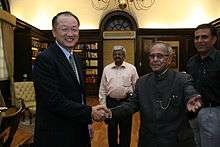
Mukherjee expanded funding for several social sector schemes including the Jawaharlal Nehru National Urban Renewal Mission. He also supported budget increases for improving literacy and health care. He expanded infrastructure programmes such as the National Highway Development Programme. Electricity coverage was also expanded during his tenure. Mukherjee also reaffirmed his commitment to the principle of fiscal prudence as some economists expressed concern about the rising fiscal defits during his tenure, the highest since 1991. Mukherjee declared the expansion in government spending was only temporary.
In 2010 Mukherjee was awarded "Finance Minister of the Year for Asia" by Emerging Markets, the daily newspaper of record for the World Bank and the International Monetary Fund (IMF). Mukherjee was praised for "the confidence [he] has inspired in key stakeholders, by virtue of his fuel price reforms, fiscal transparency and inclusive growth strategies".[31] The Banker also recognised him as "Finance Minister of the Year."[29]
The final years of Mukherjee in the finance ministry were not considered a success. The NDTV upon his resignation as Finance Minister in June 2012 wrote: "There [had] been a clamour from many quarters for a change in the Finance Ministry, with Mr Mukherjee having faced flak for several decisions where politics seemed to overwhelm economic imperatives."[32]
Other positions
Mukherjee was chairman of the Indian Statistical Institute in Kolkata. He is also the former chairman and president of the Rabindra Bharati University and the Nikhil Bharat Banga Sahitya Sammelan, as well as a former trustee of the Bangiya Sahitya Parishad and the Bidhan Memorial Trust. He has served on the Planning Board of the Asiatic Society.[5]
President of India
| Presidential styles of Pranab Mukherjee | |
|---|---|
 | |
| Reference style | Hon'ble President[33] Shri Pranab Mukherjee (within India) |
| Spoken style | President Mukherjee |
| Alternative style | Mister President |

Mukherjee was nominated as the presidential candidate of the United Progressive Alliance on 15 June 2012 after considerable political intrigue.[34][35] The elections were scheduled to be conducted on 19 July 2012 and the results were expected to be announced on 22 July 2012. As many as 81 other candidates had filed nominations but the Election Commission rejected all except that of P. A. Sangma, the nominee of the National Democratic Alliance (NDA).[36] In order to file his nomination for the presidential poll on 28 June, Mukherjee had resigned from the government on 26 June 2012.[32]
In the election, Mukherjee received 713,763 votes, while Sangma had 315,987.[37] In his victory speech, delivered outside his residence before the results were officially announced, he said:
I would like to express my deep gratitude to all of you who are waiting. The figure has crossed 7 lakhs, only one state remains. The final figure will come from the returning officer. I would like to thank the people of India for electing me to this high office. The enthusiasm, the warmth of the people was remarkable. I have received much more from the people of this country, from the Parliament, than I have given. Now I have been entrusted with the responsibility of protecting and defending the constitution as President. I will try and justify the trust of the people. I would like to reciprocate the congratulation Shri Purno Sangma has extended.[38]
Mukherjee was sworn-in by the Chief Justice of India on 25 July 2012,[39] becoming the first Bengali to hold the post of President of India.[14] After being administered the oath of office, he said we are amidist of fourth world war of terror and what minutes of peace can achieve cannot be achieved in many years of war.[40]
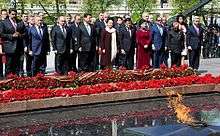
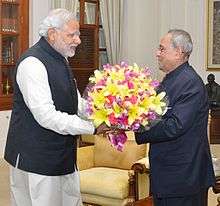
Congress President Sonia Gandhi and Prime Minister Manmohan Singh both congratulated Pranab Mukherjee on his election as President.[41] Former Communist leader Somnath Chatterjee termed Mukherjee as one of "the best parliamentarians and statesmen of India" and said the country "has got the most able man for the top job".[42] Opposition leader Sharad Yadav declared "the nation needed a president like Pranab Mukherjee."[43] Delhi Chief Minister Sheila Dikshit commented and said Mukherjee will be "one of the wisest presidents." She further marvelled at the fact that parties in the opposition ranks supported Mukherjee. "Even the NDA broke up and wanted to vote for the president to be Pranab Mukherjee."[44] The Bharatiya Janata Party (BJP) was reportedly "shocked" and "upset" at the cross-voting for Mukherjee by its legislative members.[45] However, the BJP party President Nitin Gadkari congratulated Mukherjee and said "I extend my hearty congratulations to Pranab Mukherjee on his election today as the new President of India." Gadkari further declared "I am sure that the country will make further development and progress. I wish him all success and a bright future."[46]
The Zee News noted: "What is striking about [Mukherjee] is that after more than four decades in public life, the Opposition had no ammunition against him after he was declared UPA’s choice for President. In spite of Team Anna making some noise about him being involved in some corruption cases, it has been more or less an easy ride for Pranab to Raisina Hill. Once when Sonia Gandhi announced his name, most of the allies and the Opposition came on board. Whereas, NDA partner JD(U) saw no merit in opposing him, one of the bitter critics of the Congress Shiv Sena too toed the line a little too easily. This support was not for Congress but for [Mukherjee]".[13]
Criminal Law (Amendment) Ordinance, 2013 was promulgated by Pranab Mukherjee on 3 February 2013, which provides for amendment of Indian Penal Code, Indian Evidence Act, and Code of Criminal Procedure, 1973 on laws related to sexual offences.[47][48] As of July 2015, President Pranab Mukherjee has rejected 24 mercy pleas including that of Yakub Memon, Ajmal Kasab, Afzal Guru.[49][50]
Personal life
Pranab Mukherjee married Suvra Mukherjee on 13 July 1957. Suvra Mukherjee was born and raised in Narail, Bangladesh. She immigrated to Kolkata while she was 10 and married to Pranab in 1957.[51] The couple had two sons and a daughter.[5] Suvra died on 18 August 2015, aged 74 of heart failure.[52]
He is inspired by Deng Xiaoping and has quoted him quite frequently.[53] His hobbies are reading, gardening and music.[5]
His elder son, Abhijit Mukherjee, is a Congress MP from Jangipur, West Bengal. He was elected in the by-polls held after his father vacated the seat.[54] Before his election, Abhijit was an MLA from Nalhati in Birbhum.[55]
His daughter Sharmistha is a Kathak dancer and politician of the Indian National Congress.[56]
Mukherjee celebrates the Durga Puja at his ancestral home in Mirati village.[57] He makes it a point to be at Mirati village every year to take part in the four-day rituals, the puja having a 'social dimension' for him. "I want to avail this opportunity to be with the people of my area," Mukherjee said during a puja ceremony on 4 October 2011.[57]
Honours
Mukherjee has received several accolades and honours:
National honours
 : Honoured with the Padma Vibhushan, the second highest civilian award of India, in 2008.[58]
: Honoured with the Padma Vibhushan, the second highest civilian award of India, in 2008.[58]
Foreign honours
-
 : Bangladesh Liberation War Honour (Bangladesh Muktijuddho Sanmanona), the second highest award of Bangladesh (5 March 2013;
: Bangladesh Liberation War Honour (Bangladesh Muktijuddho Sanmanona), the second highest award of Bangladesh (5 March 2013;  Bangladesh)[59]
Bangladesh)[59] -
 : Grand Cross of the National Order of the Ivory Coast (June 2016;
: Grand Cross of the National Order of the Ivory Coast (June 2016; 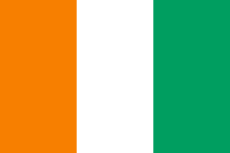 Ivory Coast)[60]
Ivory Coast)[60]
Academic honours
- Honorary Doctor of Letters degree by the University of Wolverhampton in 2011.[61]
- Honorary D.Litt by the Assam University and Visvesvaraya Technological University in March 2012.[62][63]
- Honorary Doctorate of Law by the President of Bangladesh and DU Chancellor Mohammad Zillur Rahman at the University of Dhaka on March 4, 2013.[64]
- Awarded Doctor of Civil Law (honoris causa) by the University of Mauritius on March 13, 2013.[65]
- Honorary Doctorate by the Istanbul University on 5 October 2013.[66]
- Honorary Doctorate from the University of Calcutta in 2014.
- Honorary Doctorate in political science by the University of Jordan on 11 October 2015.[67]
- Honorary Doctorate by the Al-Quds University of Ramallah, Palestine on 13 October 2015.[68]
- Honorary Doctorate by the Hebrew University of Jerusalem, Israel on 15 October 2015.[69]
Other recognition
- Best Finance Minister in the World (1984; according to a survey of Euromoney magazine).[12][70]
- Finance Minister of the Year for Asia (2010; by Emerging Markets, the daily newspaper of record for the World Bank and the International Monetary Fund|IMF]]).[31]
- Finance Minister of the Year (December 2010; byThe Banker)[29]
- Honorary Citizenship of Abidjan, Republic of Côte d'Ivoire on 15 June 2016.[71][72]
Offices held
Mukherjee's positions in chronological order:[5]
- Union Minister of Industrial Development 1973–1974
- Union Minister of Shipping and Transport 1974
- Minister of State for Finance 1974–1975
- Union Minister of Revenue and Banking 1975–1977
- Treasurer of the Congress Party 1978–79
- Treasurer of the All India Congress Committee 1978–79
- Leader of the House of the Rajya Sabha 1980–85
- Union Minister of Commerce and Steel and Mines 1980–1982
- Union Minister of Finance 1982–1984
- Board of Governors of the International Monetary Fund 1982–1985
- Board of Governors of the World Bank 1982–1985
- Board of Governors of the Asian Development Bank 1982–1984
- Board of Governors of the African Development Bank 1982–1985
- Union Minister of Commerce and Supply 1984
- Chairman of the Campaign Committee of Congress for conducting national elections to Parliament 1984, 1991, 1996 and 1998
- Chairman of the Group of 24 (a ministerial group attached to IMF and World Bank) 1984 and 2009–2012
- President of the State Unit of Congress Party in West Bengal 1985 and 2000–10
- Chairman of the Economic Advisory Cell of the AICC 1987–1989
- Deputy Chairman of the Planning Commission 1991–1996
- Union Minister of Commerce 1993–1995
- Union Minister of External Affairs 1995–1996
- President, SAARC Council of Ministers' Conference 1995
- General Secretary of the All India Congress Committee 1998–1999
- Chairman of the Central Election Coordination Committee 1999–2012
- Leader of the House of the Lok Sabha 2004–2012
- Union Minister of Defence 2004–2006
- Union Minister of External Affairs 2006–2009
- Union Minister of Finance 2009–2012
- President of India since 25 July 2012.
Books written
- Midterm Poll
- Beyond Survival: Emerging Dimensions of Indian Economy - 1984
- Off the Track - 1987
- Saga of Struggle and Sacrifice - 1992
- Challenges before the Nation - 1992 [7]
- "A Centenary History of the Indian National Congress - Vol. V: Volume-V: 1964-1984" - 2011
- "Congress and the Making of the Indian Nation" - 2011
- "Thoughts and Reflections" - 2014
- The Dramatic Decade: The Indira Gandhi Years - 2014
- "Selected Speeches - Pranab Mukherjee" - 2015
- The Turbulent Years: 1980 - 1996" - 2016
References
- ↑ "Protocol to keep President Pranab off Puja customs". Hindustan Times. 11 October 2011. Retrieved 12 July 2012.
- ↑ "Who is Pranab Mukherjee?". NDTV. 15 June 2012. Retrieved 11 July 2012.
- 1 2 3 4 5 "Biography". Pranab Mukherjee. Archived from the original on 4 September 2010. Retrieved 11 July 2012.
- ↑ "About Pranab Mukherjee" (PDF). Europe.eu. 22 June 2012. Retrieved 11 July 2012.
- 1 2 3 4 5 6 7 8 9 10 11 "Shri Pranab Mukherjee". Government of India. Archived from the original on 2011-05-14. Retrieved 11 July 2012.
- ↑ "Tehelka - India's Independent Weekly News Magazine". Retrieved 29 June 2015.
- 1 2 3 4 "FM Pranab's first priority: Presenting budget 09-10". The Indian Express. 23 May 2009. Retrieved 23 May 2009.
- 1 2 3 "Footsteps of Pranab". Mathrubhumi. 29 June 2012. Retrieved 11 July 2012.
- 1 2 3 4 "Pranab Mukherjee's USP for President: sheer experience". ibnlive. 4 May 2012. Retrieved 11 July 2012.
- ↑ "The tallest short man". Sumit Mitra. The Hindustan Times, 26 February 2010. Retrieved 27 February 2010.
- ↑ How they buried Shah Commission report, even without an epitaph Indian Express – 4 July 2000
- 1 2 3 4 "The Pranab Mukherjee Budget". Business Standard. 22 February 2010. Retrieved 8 August 2010.
- 1 2 3 4 "Pranab Mukherjee – The 13th President of India". Zee News. 22 July 2012. Retrieved 22 July 2012.
- 1 2 3 "I won't be a unique President: Pranab Mukherjee". Zee News. 24 July 2012. Retrieved 9 August 2012.
- ↑ "Why is Dr Singh Sonia's choice?". Rediff. 19 May 2004. Retrieved 10 August 2012.
- 1 2 "Pranab Mukherjee's exit from party politics is a loss and an opportunity". The Economic Times. India. 4 July 2012. Retrieved 13 July 2012.
- ↑ "India's new foreign minister Mukherjee: a respected party veteran". Agence France-Presse. 24 October 2006. Retrieved 9 April 2007.
- ↑ "India gets new foreign minister". BBC News. 4 October 2006. Retrieved 9 April 2007.
- ↑ GK Gokhale (19 April 2004). "Why is Dr. Singh Sonia's choice?". rediff.com. Retrieved 9 April 2007.
- ↑ Aditi Phadnis (29 March 2005). "Pranab: The master manager". rediff.com. Retrieved 9 April 2007.
- 1 2 3 4 "The Man Indira Trusted". India Today. 16 October 2010. Retrieved 9 August 2012.
- ↑ Balaji, J. (21 December 2011). "Prime Minister Manmohan Singh presents The Best Administrator in India Award 2011 of the K. Karunakaran Foundation to Finance Minister Pranab Mukherjee". The Hindu. Chennai, India. Retrieved 12 June 2011. Check date values in:
|access-date=(help) - ↑ "Cabinet Secretariat, Government of India". Retrieved 1 May 2012.
- ↑ "US preferred Pranab Mukherjee over AK Antony as defence minister". Times of India. 6 September 2011. Retrieved 12 July 2012.
- ↑ "Russia to remain India's topmost defence partner". Times of India. 15 November 2005. Retrieved 9 August 2012.
- 1 2 "Russia Hails Defence Cooperation With India". Spacewar. 15 November 2005. Retrieved 9 August 2012.
- ↑ Aggarwal, S. K. (1990). The Investigative journalism in India. Mittal Publications. ISBN 978-81-7099-224-0. Retrieved 10 October 2011
- ↑ Biswas, Soutik (14 October 2005). "India's architect of reforms". BBC News. Retrieved 11 December 2008.
- 1 2 3 "Finance Minister of the Year 2011". The Banker. 23 December 2010. Retrieved 23 July 2012.
- ↑ Bamzai, Sandeep (26 June 2012). "Pranab Mukherjee's stint as Finance Minister clearly wasn't his best". Daily Mail. London. Retrieved 13 July 2012.
- 1 2 "Finance Minister of Asia award for Pranab". The Hindu. Chennai, India. 11 October 2010. Retrieved 13 June 2011.
- 1 2 "Pranab Mukherjee resigns as Finance Minister; PM to take additional charge, say sources". NDTV. 26 June 2012. Retrieved 13 July 2012.
- ↑ "'His Excellency' to Go: Prez Approves New Protocol". Outlook India. 9 October 2012. Retrieved 9 October 2012.
- ↑ Prabhu, Chawla. "Pranab nominated after Mulayam-Sonia secret meet". Retrieved 4 July 2012.
- ↑ "Hunt begins for head of state". Yahoo News India. 3 January 2012. Retrieved 29 June 2015.
- ↑ "Pranab Mukherjee, Sangma final candidates for Prez polls". Daily News and Analysis. 4 July 2012. Retrieved 4 July 2012.
- ↑ "CNNIBN Blog". 22 July 2012. Retrieved 22 July 2012.
- ↑ "NDTV Blog". 22 July 2012. Retrieved 22 July 2012.
- ↑ Gupta, Smita (25 July 2012). "Pranab Mukherjee sworn-in 13th President". The Hindu. Chennai, India.
- ↑ "Fight against terrorism is 4th World War: Pranab". The Hindu. Chennai, India. 25 July 2012.
- ↑ "PM, Sonia congratulate India's new President Pranab Mukherjee". Zee News. 22 July 2012. Retrieved 1 August 2012.
- ↑ "India has got a very able president: Somnath". Zee News. 22 July 2012. Retrieved 1 August 2012.
- ↑ "India needs Pranab as president: Sharad Yadav". Zee News. 22 July 2012. Retrieved 1 August 2012.
- ↑ "Pranab Mukherjee will be a wise president: Dikshit". Zee News. 22 July 2012. Retrieved 1 August 2012.
- ↑ "Prez poll: BJP miffed over cross-voting". Zee News. 22 July 2012. Retrieved 1 August 2012.
- ↑ "Nitin Gadkari congratulates Pranab Mukherjee". Zee News. 22 July 2012. Retrieved 1 August 2012.
- ↑ "Prez Pranab Mukherjee promulgates ordinance on crime against women". Indian Express. 3 February 2013. Retrieved 4 February 2013.
- ↑ "President signs ordinance to effect changes in laws against sexual crimes". India Today. 3 February 2013. Retrieved 4 February 2013.
- ↑ "Yakub Memon and 23 other mercy pleas rejected by President Pranab Mukherjee".
- ↑ "President Pranab rejects 12 mercy pleas, a first in India".
- ↑ http://www.thedailystar.net/newDesign/news-details.php?nid=268437
- ↑ http://timesofindia.indiatimes.com/india/Suvra-Mukherjee-President-Pranab-Mukherjees-wife-passes-away/articleshow/48524004.cms
- ↑ "IISS". Retrieved 29 June 2015.
- ↑ "Pranab Mukherjee's son Abhijit Mukherjee wins Jangipur Lok Sabha seat". The Times Of India. 13 October 2012.
- ↑ "Pranab Mujherjee's son wants his LS seat, party to take call". 24 July 2012.
- ↑ Das, Mohua (12 January 2011). "Dancer who happens to be 'his' daughter-Father Pranab Mukherjee misses Sharmistha's tribute to Tagore, mom in front row". Calcutta, India: Telegraph India. Retrieved 22 July 2012.
- 1 2 "Pranab Mukherjee's Durga Puja at ancestral home". Rediff. 4 October 2011. Retrieved 11 July 2012.
- ↑ "Padma Vibhushan Awardees for year 2008". india.gov.in. Retrieved 3 April 2012.
- ↑ Pranab Mukherjee receives Bangladesh's second highest award. NDTV.com (2013-03-05). Retrieved on 2014-05-21.
- ↑ "President Mukherjee accorded with Grand Cross National Order of the Republic of Cote D'Ivoire". PTI. 15 June 2016. Retrieved 15 June 2016.
- ↑ "Honorary doctorate for Pranab from UK university". The Hindu. 27 May 2011. Retrieved 13 June 2011.
- ↑ "Small price for big prize". Calcutta, India: Telegraph India. 15 July 2012. Retrieved 22 July 2012.
- ↑ "What doctor ordered but can't get at home". Calcutta, India: Telegraph India. 1 October 2013. Retrieved 2 October 2013.
- ↑ DU honours Pranab Mukherjee. bdnews24.com (2013-03-04). Retrieved on 2014-05-21.
- ↑ "UOM — HONNEUR: Le Président de l'Inde fait Doctor of Civil Law Honoris Causa" (in French). Le Matinal. 13 March 2013. Retrieved 10 April 2013.
- ↑ http://www.sarkaritel.com/the-president-pranab-mukherjee-being-conferred-the-honorary-doctorate-by-the-dean-of-the-faculty-of-political-science-of-istanbul-university/
- ↑ ET
- ↑ Press Information Bureau
- ↑ NitiCentral
- ↑ "Shri Pranab Mukherjee". Calcutta Yellow Pages. 22 January 2001. Retrieved 23 July 2012.
- ↑ http://www.hindustantimes.com/india-news/president-pranab-mukherjee-accorded-honorary-citizenship-of-abidjan/story-dcj863ylimfiBsQbunOBUP.html
- ↑ http://presidentofindia.nic.in/press-release-detail.htm?2267
External links
| Wikimedia Commons has media related to Pranab Mukherjee. |
| Wikiquote has quotations related to: Pranab Mukherjee |
- President of India Official website of the president of India
- Parliamentary profile at India.gov.in
| Political offices | ||
|---|---|---|
| Preceded by K.C. Pant |
Leader of the House (Rajya Sabha) 1980–1984 |
Succeeded by V. P. Singh |
| Preceded by Ramaswamy Venkataraman |
Minister of Finance 1982–1984 |
Succeeded by V. P. Singh |
| Preceded by Mohan Dharia |
Deputy Chairperson of the Planning Commission 1991–1996 |
Succeeded by Madhu Dandavate |
| Preceded by Dinesh Singh |
Minister of External Affairs 1995–1996 |
Succeeded by Atal Bihari Vajpayee |
| Preceded by Atal Bihari Vajpayee |
Leader of the House Lok Sabha 2004–2012 |
Succeeded by Sushil Kumar Shinde |
| Preceded by George Fernandes |
Minister of Defence 2004–2006 |
Succeeded by Arackaparambil Kurian Antony |
| Preceded by Manmohan Singh |
Minister of External Affairs 2006–2009 |
Succeeded by Somanahalli Mallaiah Krishna |
| Minister of Finance 2009–2012 |
Succeeded by Manmohan Singh | |
| Preceded by Pratibha Patil |
President of India 2012–present |
Incumbent |
he made a biggest mistake to select modi as a prime minister